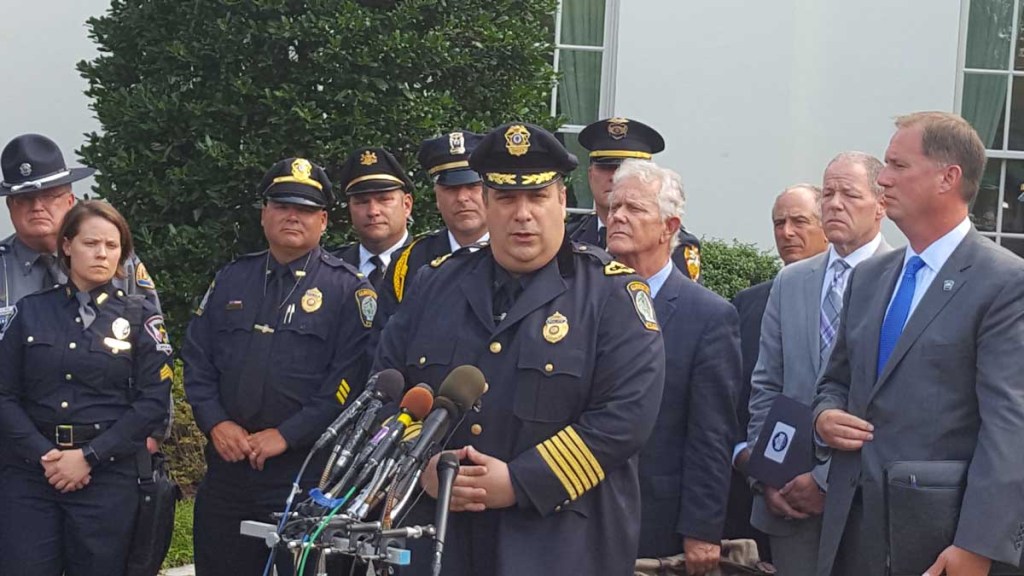Gloucester police chief blasts defeat of opioid funding
Published 4:45 pm Wednesday, July 6, 2016

- Gloucester Police Chief Leonard Campanello speaks to the press Wednesday outside the White House, where he and 16 other law enforcement leaders spoke with Obama administration officials about funding for programs to fight opioid addiction. Gloucester Police Lt. David Quinn, left of Campanello, attended the meeting, as well. Photo by Kery Murakami
WASHINGTON – Leonard Campanello, police chief in Gloucester, Massachusetts, joined more than a dozen law enforcement officials blasting Congressional Republicans on Wednesday for failing to agree to spend $1.1 billion to increase treatment for opioid addicts.
“I think it’s disgraceful,” Campanello told reporters after emerging from a meeting with 16 other police chiefs and top Obama administration officials at the White House.
“Four people in my state are going to die of heroin overdoses on my way home,” he said.
Earlier in the day, a Republican-led committee smoothing out differences in plans to fight and treat opioid addictions rejected a Democratic proposal to increase funding by $920 million.
A draft unveiled by Republicans instead called for $85 million in funding over five years, according to a Congressional Budget Office analysis.
Obama had asked for $1.1 billion, mostly to help buttress treatment programs.
Wednesday’s appearance was Campanello’s second trip to the White House in three months. He was also honored in April for his department’s program allowing drug addicts to come to the police station seeking help without fear of arrest.
The Obama administration and Democrats in Congress were pushing for more than a ten-fold increase in funding for opioid treatment.
This week, 17 House and Senate Democrats wrote a letter vowing to vote against any compromise that offers less than $920 million in funding over two years.
According to a White House fact sheet, Massachusetts could have received up to $20 million over the next two years in additional funding under Obama’s proposal.
In a call with reporters, White House drug policy director Michael Botticelli said only 12 percent of an estimated 2.2 million opioid addicts are able to get into treatment.
He said “a significant and robust infusion” of money is needed to deal with the drug epidemic.
But Rep. Jim Sensenbrenner, R-Ohio, called the Democrats’ threat “political gamesmanship” and accused them of an “irresponsible and an outrageous dereliction of duty.”
Sensenbrenner, sponsor of the House bill, called the Republican approach a “common sense, fiscally responsible plan.”
Sen. Chuck Grassley, R-Iowa, also criticized Democrats’ threats to oppose the legislation over funding.
The proposals in Congress include such measures as requiring states that take funding for child protective services implement requirements that babies born with opioid addictions can only be released to parents with a plan to ensure their safety.
The bills also include a provision to create a task force to update guidelines on the prescribing of opioids.
But Campanello, who met with officials including Chief Joseph Solomon of Methuen, Massachusetts, decried the political disagreement.
“People are dying on both sides,” he said, referring to the two parties.
Law enforcement can keep cracking down on drug dealers, said Frederick Harran, public safety director of Bensalem Township, a suburb of Philadelphia.
But it cannot make progress fighting the epidemic without more long-term treatment, he said.
“We’re just putting people in and out,” he said, referring to short-term counseling.
As the congressional debate plays out, the Obama administration announced measures it is taking on its own.
One step increases from 100 to 275 the number of patients to whom an individual physician can prescribe the drug buprenorphine, used to treat narcotic addictions.
The drug helps ease withdrawal symptoms for those trying to get off opioids.
Doctors said the limit has kept them from meeting demand in rural areas, where physicians are few and far between.
Kery Murakami is the Washington, D.C. reporter for CNHI’s newspapers and websites. Reach him at kmurakami@cnhi.com





